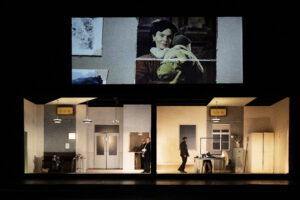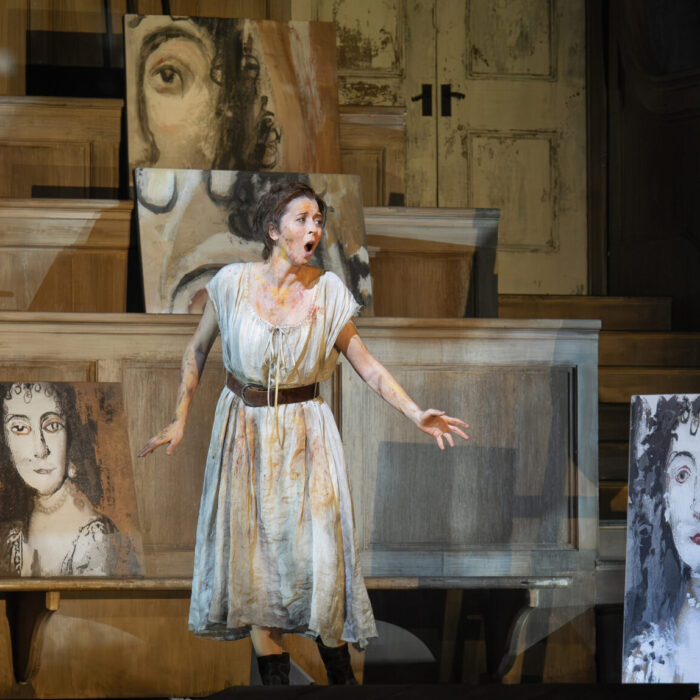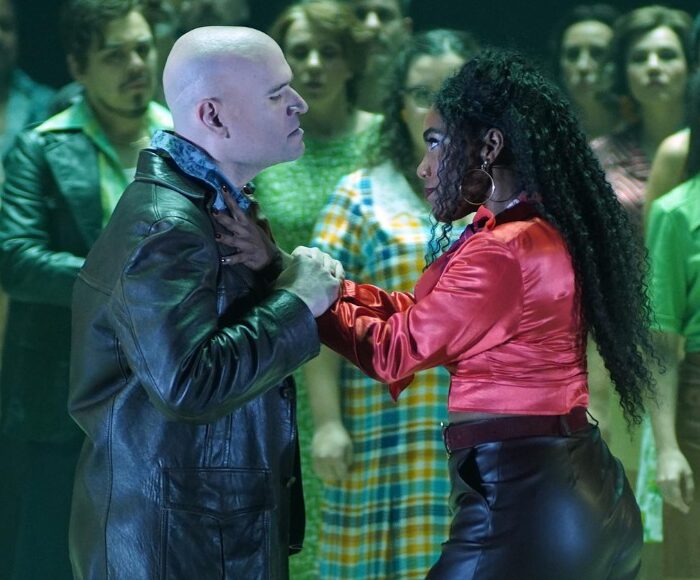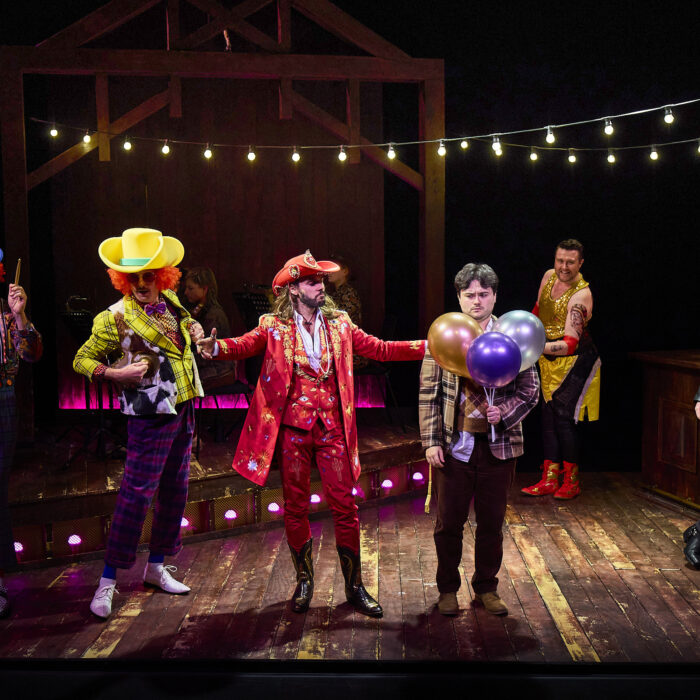
Royal Ballet & Opera 2025–26 Review: The Makropulos Case
By Sophia Lambton(Photo: Camilla Greenwell)
Pinching twitching nerves, Czech master Janáček’s angst-ridden “The Makropulos Case” warns of extra life. Lead role Emilia Marty’s present incarnation joins a palimpsest: Eugenia Montez, Ellian MacGregor, Ekaterina Myshkin, Else Müller and the titular Elina Makropulos. A magical elixir has sustained her for three centuries.
Strife drives the aria-void work. Through strings unhinged, alarming accidentals and duplicitous motifs, a crazed mind craves its end. Yet an ambiguous libretto has Emilia wrestling with mere boredom. While the words present a nonchalant pre-corpse, unruly music speaks to madness.
Courted by a slew of suitors, opera star Emilia has been cursed with irresistible allure: one of her potion’s by-products. While lawyers battle for their clients’ right to an estate, she hides the name of the true heir. Her wiles charm members of each party–sympathetic Albert Gregor on one side and father and son Jaroslav and Janek Prus on the exigent other. A geriatric count remembers her from decades past. Aspiring opera singer Krista emulates her greatness.
Bland, banal and beige, director Katie Mitchell’s new production for the Royal Opera premiere of “The Makropulos Case” scraps this tale. Across a stage, presenting split parts of a mid-range luxury hotel, the customary supertitles and a screen with flicking images, web surfing and incessant messaging, spectators crisscross between tabs. The core of this composite is a second-rate Prime series that conceals both Janáček’s libretto and its source in Karel Čapek’s 1922 play.
In Mitchell’s overwriting story Krista’s adulating ingenue has grown into a thieving hustler. Catfishing her way into Emilia’s life, the girl seduces with the aim of later raiding her possessions. Callously she photographs the items–sending them in images projected on the screen to co-conspirer Janek. While Emilia debates the probate case with lawyers, these are cited in displayed texts rich in curse words, innuendo and emojis.
All three are in discord with the music. When Gregor seems to try to rape Emilia, she sends Krista an “I love you” SMS. Mere moments after she has pulled a gun on him, the next line reads “I miss that” followed by a peach emoticon. Not only do the messages flout Janáček’s orchestral score, they clash with Mitchell’s drama.
Videos throw viewers into vertigo-inducing close-ups. Supertitles come updated to suit modern English, but with edits. The original expresses Krista’s awe of her undying idol with the promise that she’ll “leave the theater, as Emilia Marty is the greatest singer in the world!” (“Já půjdu od divadla, to je největší zpěvačka na světě!”) In Mitchell’s pseudo-miniseries, this is differently translated and immediately follows Krista’s onscreen text–which vents of having to listen to old, rich men discuss opera. Her attitude toward the craft is deprecating.
Act three in Janáček’s libretto opens on Emilia and Baron Prus in a hotel room. The latter’s promised her a document securing her descendant Albert Gregor’s victory on the condition that she sleep with him; it’s now the morning after. Desperately she pleads, “Nu? Slyšíte? Dejte mi tu obálku!” (“Do you hear me? Give me the envelope!”). Mitchell’s staging shows the act and adds a line to let Emilia ask, “Are you finished?” in a musically-denying stab at humor. Equivalent prosaic license would be Tosca mocking Scarpia’s manhood as she takes the knife.
Buried under layers of extraneous exposition, the production’s cast made noble efforts at the opera’s opening night. It should be noted nonetheless that they did not play the libretto’s parts but Mitchell’s.
Plagued by rage, soprano Aušrinė Stundytė incarnated a desire to decay. Through an array of first emboldened then enfeebled gestures her Emilia lost hope. Chronic rows of triplets, duplets and quintuplets came with antsy pacing but the vocalist’s pitch wavered. Act one’s “Ó, nechci zdržovat” (“Oh, I wouldn’t want to waste your time”) emerged with an unstable high F sharp. Soon after, “Pepi přece myslel na Gregora” (“Pepi was talking about Gregor”) shaped a shrill high G. Despite her deathbed prayer “Pater hemon, hos eis uranois!” offering relief, high Gs both sharp and natural were not peaceful.
Zeal pealed in the despairing characterization of Sean Panikkar’s Albert Gregor. Burning with intoxication by Emilia, he sang of how she “suddenly came from God knows where” (“A najednou jste přišla vy bůhví odkud”) with a vibrato sparking nervous excitation. “It scorched me like a furnace” (“Dýchlo to na mne jako z výhně”) resonated with ferocious top notes but on some occasions like the sextuplet of “Jak víte o tom testamentu?” (“How do you know about that will?”) they floundered.
Commandeering peers like subjects, bass-baritone Henry Waddington intoned recitative with tyranny as Kolenatý. Apt punctuation treated triplets like a spree of bullets spilling his authority. Each grilling probe was menacingly held – including Act 1’s description, “Josef Ferdinand Prus, který zemřel bezdětek a bez závěti roku 1827—” (“Josef Ferdinand Prus, who died childless and intestate in 1827—”), which included two double whole notes on a high C flat.
Exploitative potential heir Baron Jaroslav Prus was lent due condescension by the growly tones of Johan Reuter. Referencing his lack of intimate experience beside the late Elina Makropulos (“nemá tolik zkušeností v jistých věcech jako ta dívka”), he sculpted pulsing utterances of disgust. Dismissive lines were hurled out with a tasteful combination of legato and contempt.
Peter Hoare as Vitek tackled triplets trippingly to introduce the opera, staying lyrically elegant and corporally coarse throughout. Onstage through the majority of this production, soprano Heather Engebretson channeled this faux-Krista’s arrogance with brash contralto tones. A comely composition of vibrato rounded risky notes with confidence. Tenor Daniel Matoušek paced his unabated fear with smoothness and Count Hauk-Šendorf’s soliloquy was lent endearing vulnerability by Alan Oke.
Obscured beneath this cavalcade of plots and props and pictures, Jakub Hrůša’s orchestra evoked life’s fragments. As Emilia felt oversated, drones on piccolo played an alarm clock; horns and oboes mimicked grimaces. In sequence flutes and violins screeched like a fire drill and tremolo was flinching skin. Hitching itself finally onto a melody, the score embraced a harmony when its exhausted heroine expired. Strings’ adagio serenaded her as Hrůša brought deliverance by death.
Such liberty was not awarded to the opera as a whole. This take on Janáček’s “The Makropulos Case” was neither a reimagining nor adaption. Censorship defined it.



